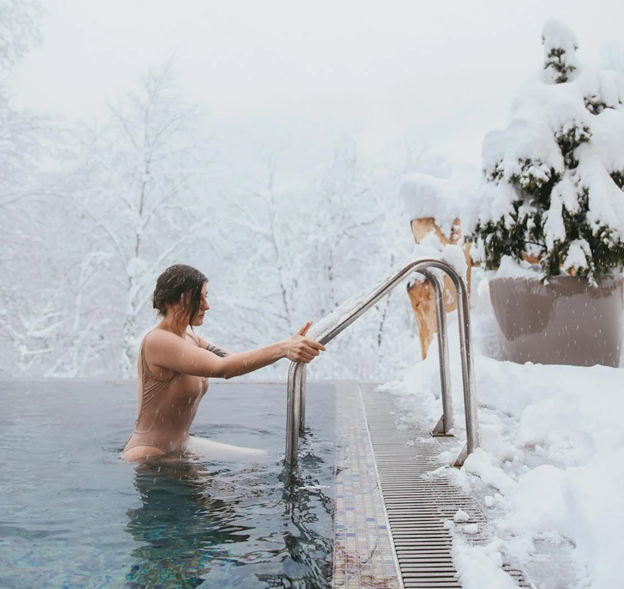You might live in an area where the weather can be extreme, where the summers can be hot and the winters unforgiving. So when you own a pool, you might need to choose a liner that will be durable no matter the weather.
And when considering the best type of swimming pool for cold climates, vinyl pool liners emerge as the top choice. Their durability, adaptability, and cost-effectiveness make them an ideal option for regions that experience harsh winters and extreme temperature fluctuations.
In contrast to concrete and fiberglass pools, which can suffer from structural damage due to freeze-thaw cycles, vinyl liner pools provide a resilient and low-maintenance alternative. Here’s why vinyl pool liners stand out as the superior choice for cold weather conditions.
Superior Resistance to Freeze-Thaw Cycles
Cold climates pose a significant challenge to swimming pools, particularly due to the freeze-thaw cycle. As temperatures drop, water in and around a pool can freeze and expand, exerting pressure on the pool structure.
Concrete pools, which rely on their rigid structure, are highly susceptible to cracking and surface damage due to these repeated cycles. Even with proper winterization, the risk of damage remains high, leading to costly repairs and resurfacing.
Fiberglass pools, while somewhat more flexible than concrete, still face issues in extremely cold weather. The material’s plastic composition can become brittle at sub-zero temperatures, making it more vulnerable to damage when subjected to the natural movement of the ground during seasonal changes.
Vinyl liner pools, on the other hand, are uniquely suited to endure these conditions. The flexible nature of the vinyl allows the pool structure to accommodate minor ground shifts without cracking or suffering permanent damage.
Even in extreme winter conditions where temperatures can drop well below freezing, vinyl liners maintain their integrity, with many lasting upwards of 10 to 20 years before needing replacement.
Adaptability to High Water Tables
Another critical advantage of vinyl liner pools in cold weather environments is their suitability for areas with high water tables. When groundwater levels rise due to seasonal fluctuations, there is a risk that certain pool types may be lifted or displaced. This issue is particularly problematic for concrete and fiberglass pools.
Concrete pools rely on their weight to stay in place, but when empty or partially drained, they can experience hydrostatic pressure from underneath, leading to structural failure or cracks. Fiberglass pools are at an even greater risk, as they can physically lift or “float” out of the ground when subjected to excessive water pressure.
This occurs because the fiberglass shell is relatively lightweight and can be forced upward in the same way that a submerged beach ball resists being pushed underwater.
Vinyl liner pools, while not entirely immune to high water table issues, are far less prone to catastrophic failure. Even if groundwater causes minor shifting, the liner itself is replaceable, making repairs more manageable compared to the extensive reconstruction often required for concrete and fiberglass pools.
Moreover, preventive measures such as sump wells or French drains can be installed to effectively manage groundwater levels, further reducing the risk of displacement.
Cost-Effectiveness and Longevity in Harsh Climates
Beyond their structural advantages, vinyl liner pools are significantly more budget-friendly than both concrete and fiberglass alternatives. Cold climates demand regular maintenance and occasional repairs due to the harsh environmental conditions.
The cost of resurfacing a concrete pool or repairing fiberglass cracks can be prohibitively high, especially in regions with long and severe winters.
Vinyl liners, in contrast, offer an economical alternative. Even in the event of liner damage, replacing the liner is far less expensive than resurfacing a concrete pool or repairing a fiberglass shell.
Additionally, modern vinyl liners are built to be highly durable, resistant to punctures, and capable of lasting decades when properly maintained. Their smooth surface also makes them less susceptible to algae buildup, reducing the need for extensive chemical treatments and cleaning during the warmer months.
Sunlight and Vinyl Liner Pools
While vinyl liners are an excellent choice for cold weather, there is one unique factor that pool owners should be aware of—sunlight reflections from high-efficiency windows. In some cases, intense reflections can concentrate sunlight onto a specific area of the liner, potentially causing it to melt.
While this is a rare occurrence, homeowners in cold regions should be mindful of their pool’s placement relative to reflective surfaces. Applying window films or strategically landscaping around the pool can mitigate this issue and prevent any damage.
Best Buy Pool Supply Has Vinyl Liners for Your Pool
For homeowners living in extreme climates and cold climates, vinyl pool liners offer an unbeatable combination of durability, flexibility, and affordability. The unique qualities of vinyl makes them the ideal choice for areas with extreme winter conditions.
Vinyl liners perform well in cold environments where expansion, contraction, and groundwater movement are major concerns. With proper care, a vinyl liner pool can provide decades of reliable service, making it the best investment for those looking to enjoy a backyard oasis in even the harshest winter regions.
Go to Best Buy Pool Supply now to find vinyl pool liners for your inground pool and make it cold weather-proof!

